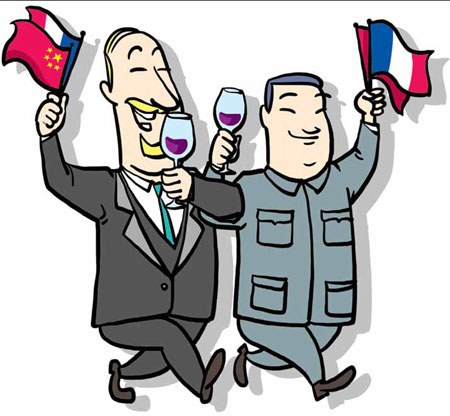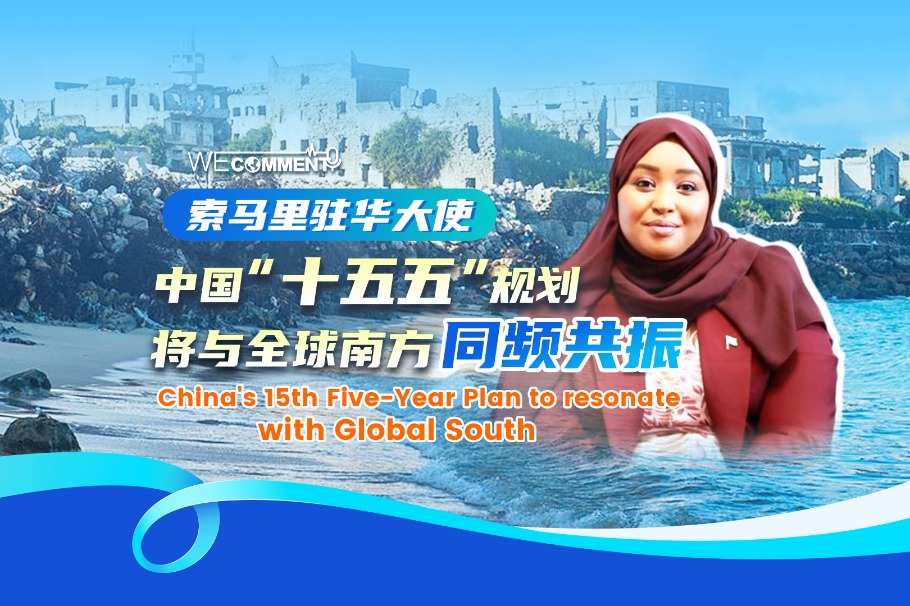Renewed ambition for Sino-French ties

Nature of relationship with China will define Hollande's presidency

Since economic, political and strategic relations between Europe and China are not commensurate with their mutual appreciation and reciprocal attraction, a formidable potential for synergy between the two edges of the continent still awaits to be unleashed.
The new French president, Francois Hollande, obviously faces daunting challenges on the economic front at home and in the eurozone, but the nature of the relations he will forge with China, the 21st century's most important factor of change, will also define his presidency.
At a time when the distribution of power is shifting rapidly - when Nicolas Sarkozy became French president five years ago, France's GDP was 73 percent of China's; it will be 33 percent in 2012 and less than 25 percent by 2017 - leaders have to question their assumptions and reevaluate their priorities.
The new resident of the Elysee Palace and the leadership which will emerge from the 18th National Congress of the Communist Party of China in the autumn can open a new chapter in Sino-French relations, contribute to the deepening of links between Brussels and Beijing and take Sino-Western synergy to another level.
Hollande, who does not share his predecessor's reverence for the US, is in a position to have a more independent policy toward China, and if the White House has certainly gained a partner in its quest for economic growth, it cannot view Paris any more as an acquiescent and unconditional ally. At the coming 25th NATO Summit in Chicago which will focus on the alliance's commitment to Afghanistan, Hollande will announce the withdrawal of the French troops from the Central Asian country before the end of the year.
To use the words of the former French foreign minister Hubert Vdrine, Hollande considers France and the US as "friends, allies but not aligned" "amis, allis mais pas aligns".
During his long campaign the socialist candidate underlined the importance of stable relations between the two permanent members of the UN Security Council - in contrast with the fluctuations of the Sarkozy era - but also, in reference to the 27 billion euro trade deficit with China in 2011, called for more balanced economic relations between the two countries.
The French president will meet his Chinese counterpart Hu Jintao at the G20 Mexico Summit but, on May 7, only several hours after his historical victory he received Kong Quan, the Chinese ambassador to France, an encounter which followed a conversation with Charles Rivkin, the top American diplomat in Paris. After a phone conversation with German Chancellor Angela Merkel on the day of his election, the series of exchanges composed a highly relevant sequence in a century which will be largely characterized by the interaction between Washington, Brussels and Beijing.
Besides, by choosing a China expert, Paul Jean-Ortiz, as his top diplomatic advisor three days after his victory, Hollande signaled that he put in place a team especially in tune with Chinese dynamics.
In his discussion with the Chinese envoy, Hollande vowed to further Sino-French cooperation, asked for the two countries to strengthen collaboration in the G20 and stressed the necessity to push forward economic links. Clearly, there is considerable space for improvement: Sino-French trade represented in 2011 only 40 percent of Sino-German trade whose amount reached 144 billion euros - a third of total EU-China trade.
A renewed bilateral relationship can certainly contribute to enlarging the horizon of Sino-European relations. Paris can act as a catalyst for a more autonomous EU external policy toward Beijing. It is becoming urgent for European policymakers to design mechanisms in order to attract Chinese investment to Europe - China will invest abroad more than $1 trillion in the coming decade; they should grant China market economy status - which will be, in any case, accorded to Beijing under WTO rules from Dec 11, 2016; lift an inopportune and counterproductive arms embargo; closely consult China on security issues; and work on ambitious Sino-European cooperation in third countries from Africa to Central Asia.
Some commentators have noticed that relations between Beijing and the French left have been at times unsteady - it was under Francois Mitterrand in the early 90s that Paris sold Lafayette-class frigates to Taiwan; and others have expressed concerns about the lack of international experience of the new French president.
However, the 2012 French presidential election offers at least two obvious lessons. First, Hollande has systematically proved wrong those who underestimated him; and second, his victory marks the return of politics, and in the midst of inevitable moments of turbulence, it is the political determination to put Sino-French relations into a strategic and long-term perspective which will prevail.
In his congratulatory message to the new French leader, Hu Jintao mentioned "the long-time friendship and cooperation between China and France which is significant in safeguarding and promoting global peace, stability and development".
In 1964 following the decision of Charles de Gaulle, France was the first among the major Western countries to establish diplomatic relations with Beijing at the ambassadorial level, and under Hollande's presidency, Paris and Beijing will celebrate the 50th anniversary of this historical moment.
On Jan 31, 1964, de Gaulle concluded a press conference at the Elysee Palace by a remark on what he called the "affinities" between France and China. These cultural and historical "affinities" have to be reactivated and serve as the fulcrum of a new joint global ambition.
The world is greatly benefiting from the French and Chinese humanistic traditions, but in a century of unprecedented interdependence, it is the quality of their articulation which can make a difference.
The author is director of the Academia Sinica Europaea at China Europe International Busines School (CEIBS), Shanghai, Beijing and Accra, and founder of the Euro-China Forum. The views do not necessarily reflect those of China Daily.
Today's Top News
- Lawmakers' thousands of proposals receive responses
- China warns Japan against interference
- Nation's euro bond sale shows investors' confidence
- No soft landing for Tokyo's hard line
- Commerce minister urges US to increase areas of cooperation
- Strong demand for China's sovereign bonds signals global confidence






























